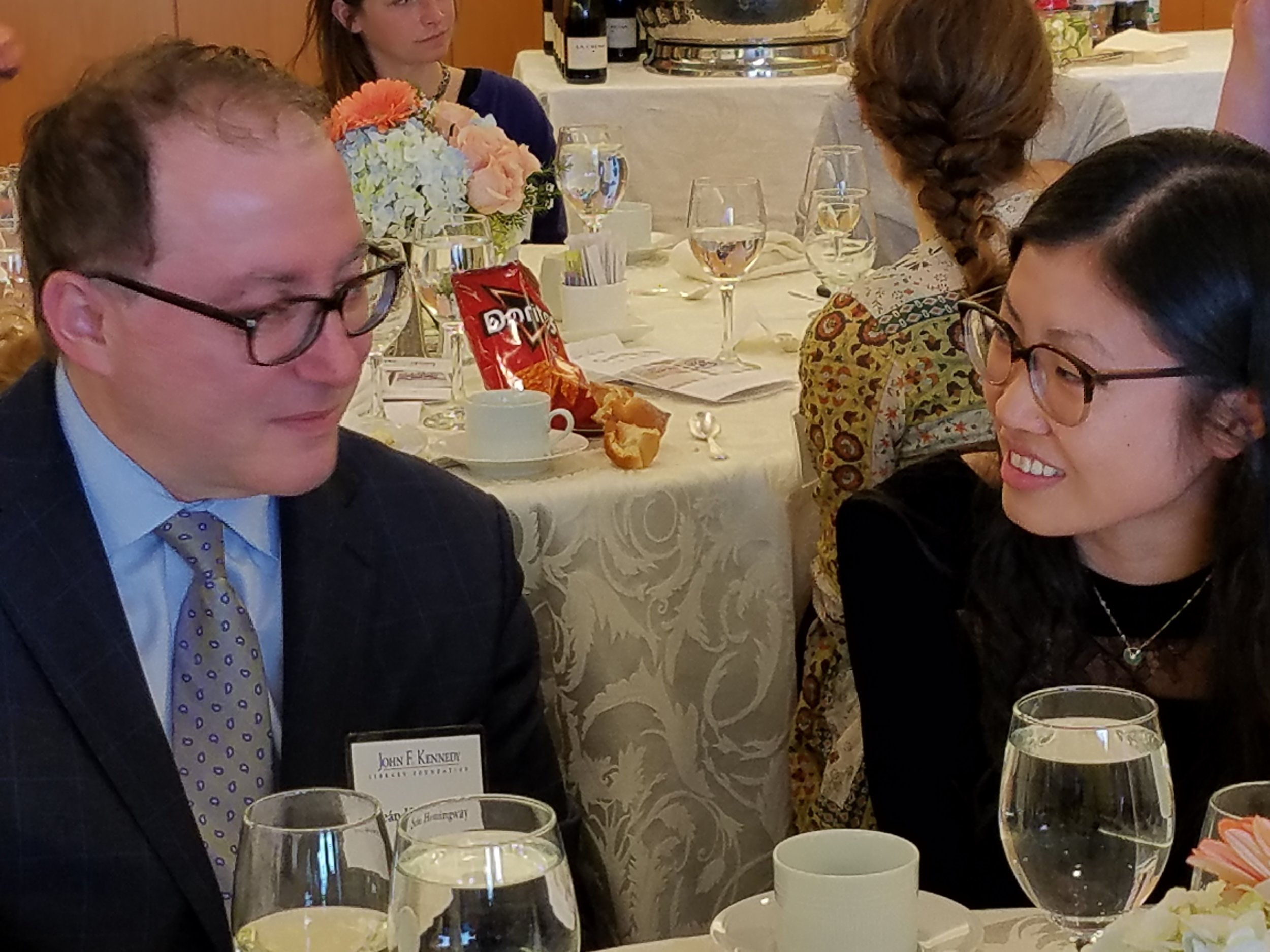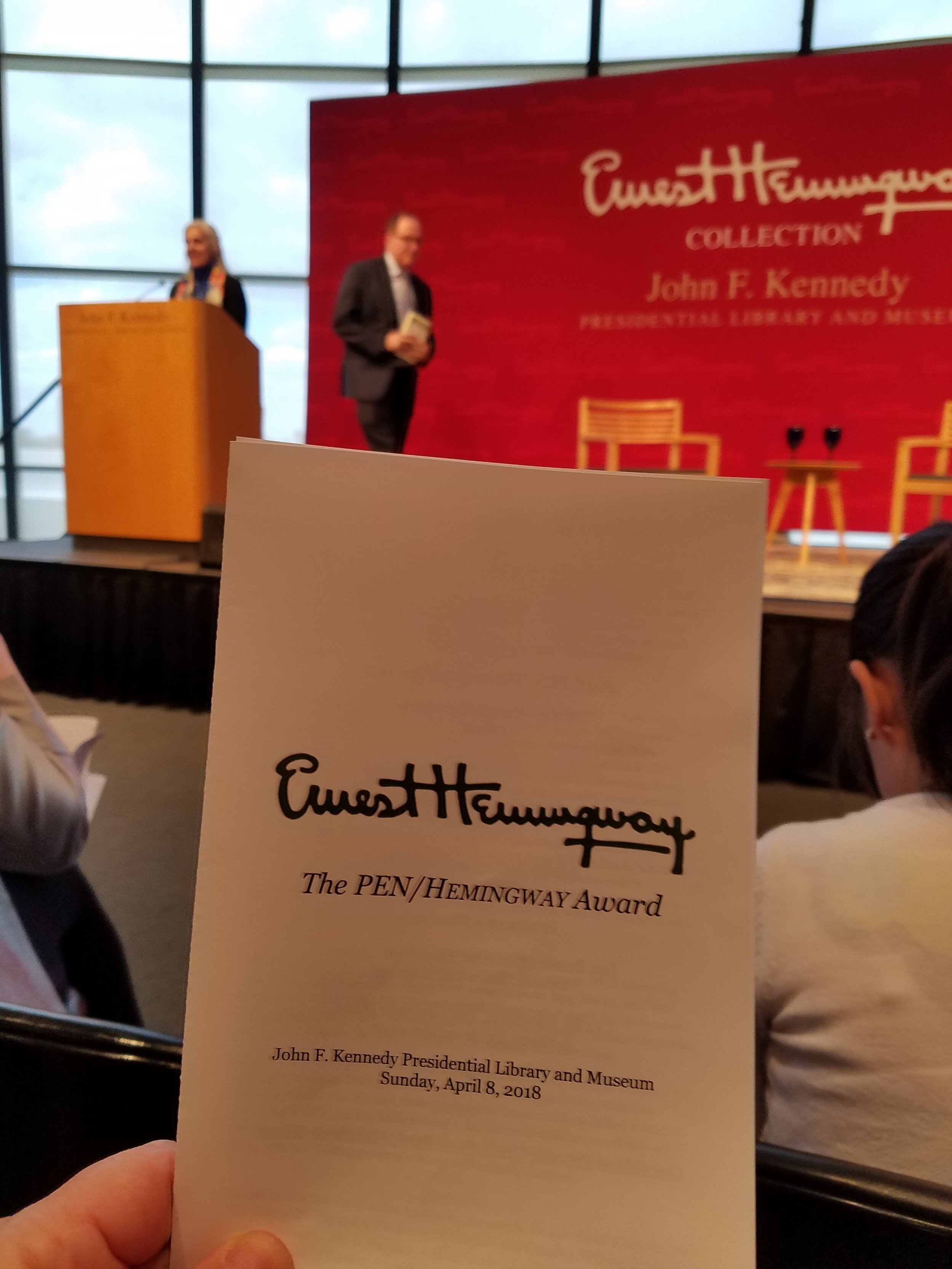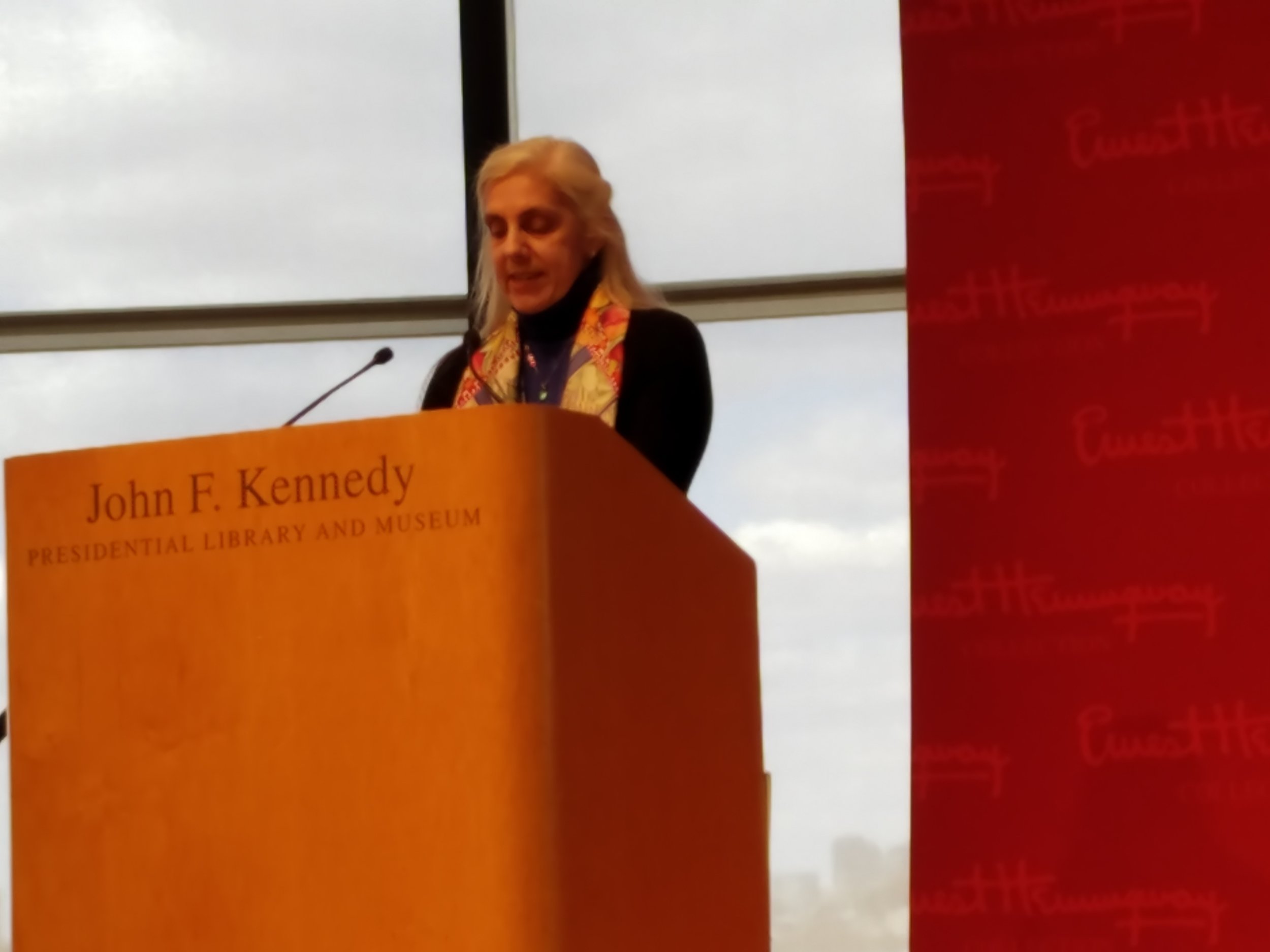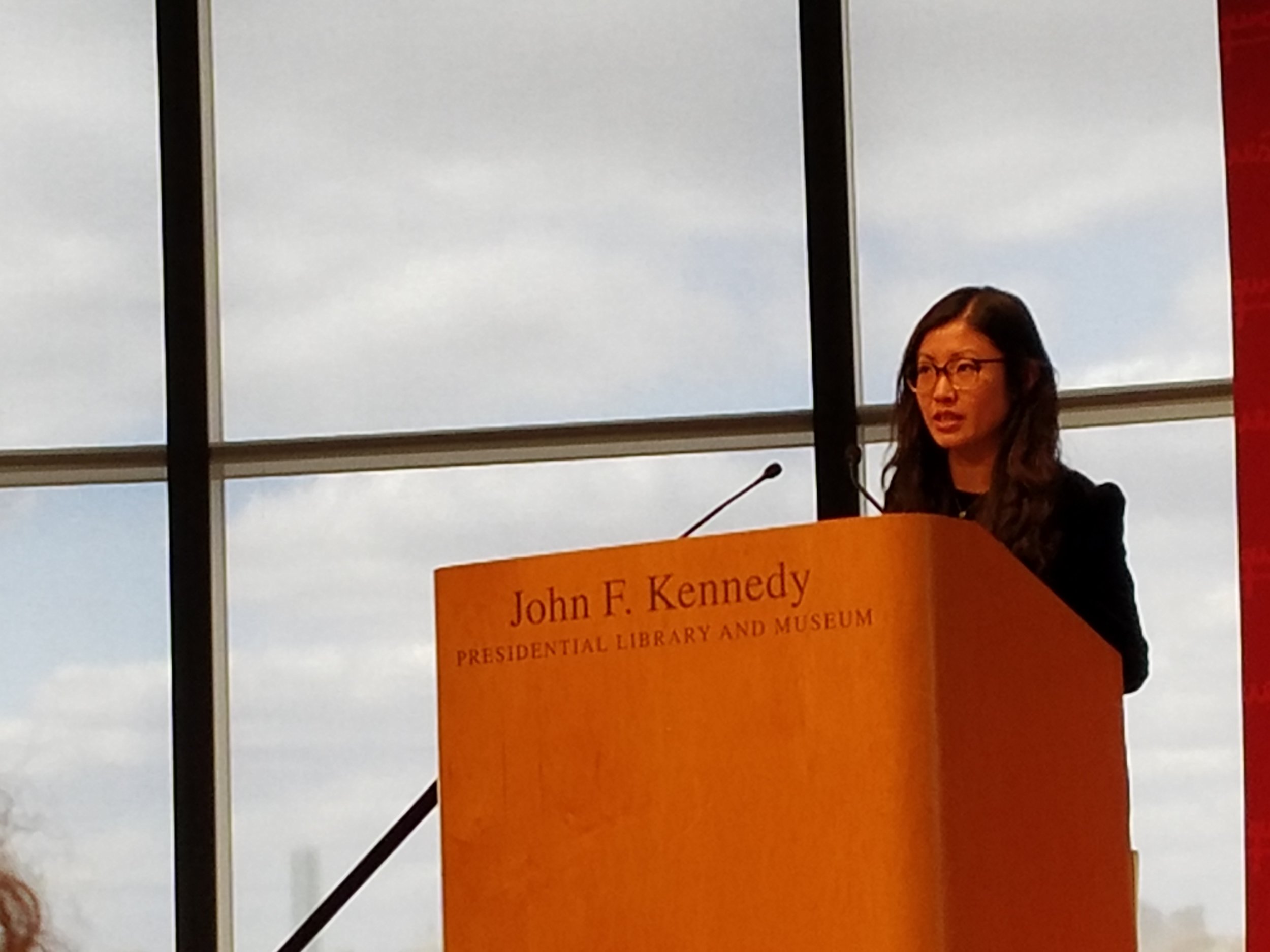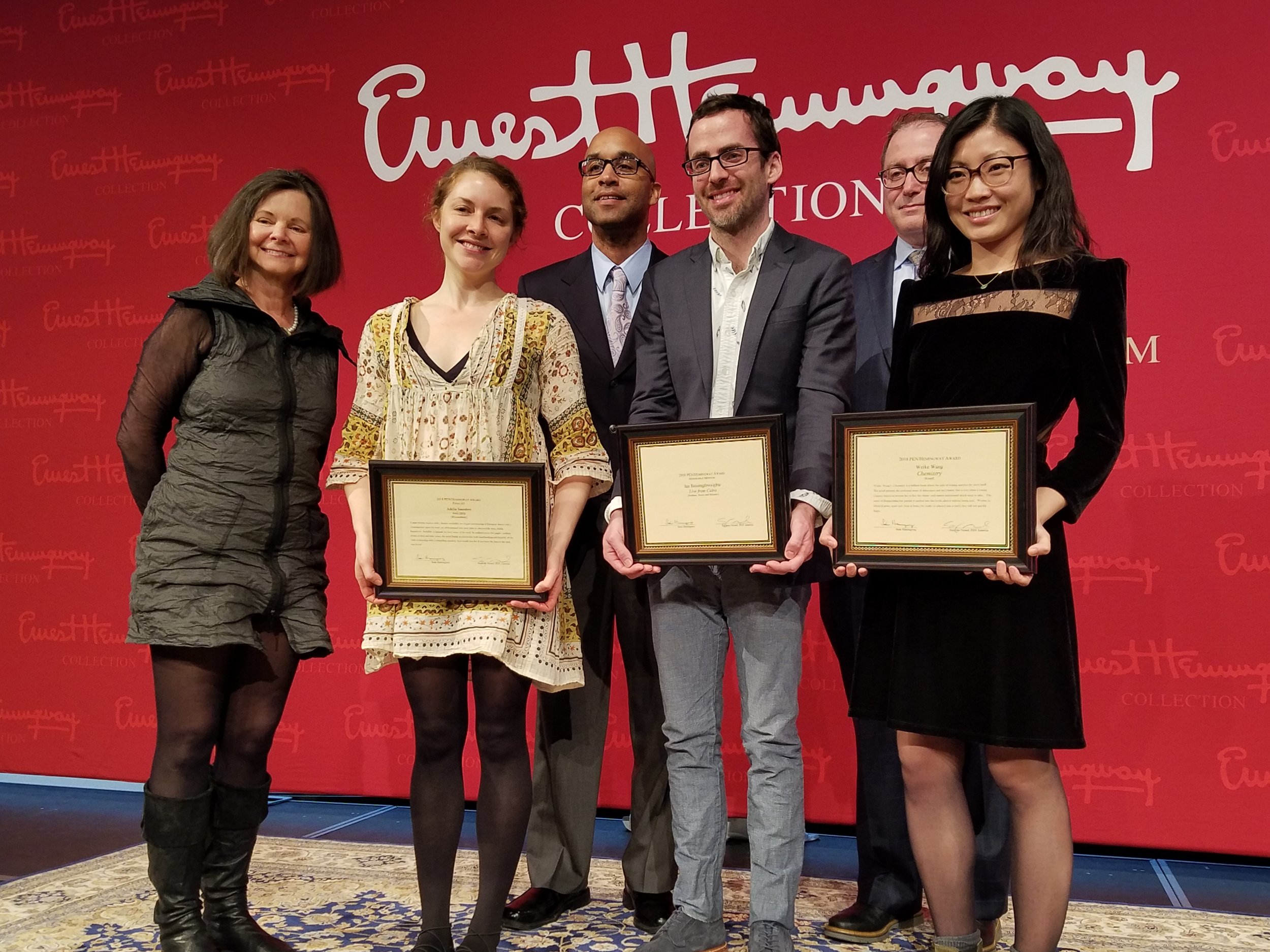I wrote this account of the 2018 PEN/Hemingway Award event for the newsletter of the International Hemingway Society. Here it is, including a brief interview with Weike Wing, author of the award-winning novel, Chemistry.
By STEVE PAUL
This was a transitional year for the annual PEN/Hemingway literary awards, which the Ernest Hemingway Foundation has co-sponsored for more than four decades. Not long before the April 8 awards event in Boston, our longtime co-sponsor, the New England PEN organization, ceded administration of the program to its parent organization, PEN America. The New York-based advocacy group oversees a long lineup of annual literary awards.
Without the presence of New England PEN and its own regional literary awards, this year’s event at the John F. Kennedy Presidential Library and Museum was somewhat smaller than usual but wholly focused on the Hemingway award, which honors a first book of fiction. Seán Hemingway (pictured above with Weike Wang), standing in for his uncle Patrick, oversaw the proceedings, in which the 43rd annual PEN/Hemingway award went to Weike Wang, author of the novel Chemistry. (More on Wang and her book below.)
The audience heard from awards judge Geraldine Brooks and Suzanne Nossel, CEO of PEN America, which is operating in overdrive, she said, during a “crisis for expression in our own country.” Ricardo Cortez Cruz, author of the novel Straight Outta Compton and professor of English and creative writing at Illinois State University, gave a stirring keynote about Hemingway and “the joy and optimism that comes with knowing that writing can change the world.”
Dr. Hilary K. Justice (pictured at the lectern), specialist at the JFK’s Hemingway Collection, opened the proceedings with a smart and lyrical essay based in part on her call for the Hemingway community to identify their favorite Papa sentences.
The PEN/Hemingway program also highlighted two finalists: Lisa Ko, for The Leavers, and Adelia Saunders, author of Indelible. Honorable mentions went to Ian Bassingthwaite for Live from Cairo, and Curtis Dawkins, author of the prison novel The Graybar Hotel.
Wang receives $25,000 and residencies at the University of Idaho and the Ucross Foundation in Wyoming. The runners-up receive smaller amounts. Along with our Ernest Hemingway Foundation and PEN America, sponsors of the program include the Hemingway family, the JFK Presidential Library and Museum and its associated support organizations.
Weike Wang’s Chemistry is a briskly moving short novel about a young woman, daughter of Chinese immigrants, who is struggling with her American identity, her family and boyfriend relationships, and with the doctoral chemistry lab that threatens to define her future. A few days after the ceremony in Boston, I got in touch to command her attention for a brief email interview. It appears here with only slight revisions for clarity.
Q. First, can you give me a recap of your path towards writing? You apparently were in another field (chemistry? public health?), so when, how, and why did you veer into fiction?
A. I was undergrad chem and English. I was also premed. Then the latter didn't quite work out and I moved into grad school for cancer epidemiology. I have always been writing fiction, but I don't think it is necessarily a profession you go into as it is one you fall into. When I finished the MFA and wrote this novel, I had no idea any of this would happen. I had hoped, but never actually thought it would. I can sometimes be self destructively practical. Had the novel not worked out, my plan was then to find a job in epi and move on from writing.
Q. There are no right answers here, but in your workshopping and MFA did you develop any ideas or relationship, pro or con, with Hemingway? It's always interesting, because very few PEN/Hemingway winners -- the books, I mean -- feel as if they've been influenced by his work.
A. That is true, but I did read the story “Hills Like White Elephants” during my MFA. I came to Hemingway's work fairly late, in college and later I would say. But I have a good relationship with Hemingway's work. I learned a great deal from him in terms of dialogue (especially from the above story) and shaping a piece of fiction to mimic something in real life yet to still be inherently fiction. What I love about that first story I read of his is the explosiveness both explicit and subversive.
Q. Your reading on Sunday really heightened the humor that seasons your novel. I've been thinking about that and wonder whether humor is a concerted strategy or comes out of your natural authorial voice or emerges from your vision of the narrator's character?
A. Voice, I believe. I don't think I could write anything without some ounce of humor. You cannot have dark without light. Humor has been my natural way of coping with growing up. But I do think it works well in writing and I take a leaf of that ability from teachers like Amy Hempel and Sigrid Nunez.
Q. Sorry for the obvious question, but does your narrator's experience reflect elements of your own life or is she wholly invented? This, of course, is a Hemingway issue, given that readers always seem to expect that he was writing about his own life.
A. Ah. When I met Seán at the lunch, he told me he had read some earlier drafts of “Hills Like White Elephants” and the very first draft read more like a recorded conversation and was probably a recorded conversation between Hemingway and Hadley. Then the shaping of the work happened and now we have this brilliant story that has no bearing with the original conversation but used it as a springboard. That is how I feel about this book. I took a lot of elements from my life. The science and PhD world is as part of me as football and baseball lingo is to my husband. The longer I write the more I see that transforming the prose is a large part of being the writer. Much of that transformation happens in revision, hence why revision is so paramount.
Q. The structure of "Chemistry" seems something like an orchestration of atomic particles and really benefits from its non-linear but ultimately forward motion. How did you determine to write the novel that way?
A. I think the non-linear narration came from my inability to write a straight story from event to event. I favor the collage structure. I think it gives the reader and writer a more immersive experience. I also found something clunky about going from chapter to chapter, putting in a “cliff hanger,” finding the “hook.” Much of the book is also about language and the flow of language, so I wanted it to move fairly seamlessly.
A. What's next for you? Also, are you still teaching?
Q. More books! Hopefully. I am working on a second novel and stories. I'm not teaching this semester but I will be next semester at Barnard and UPenn. Teaching is pretty fun. Students are funny, in a good way. But also I guess in a funny way.
Hemingway Society member Steve Paul is author of Hemingway at Eighteen: The Pivotal Year That Launched an American Legend (Chicago Review Press, 2017).
